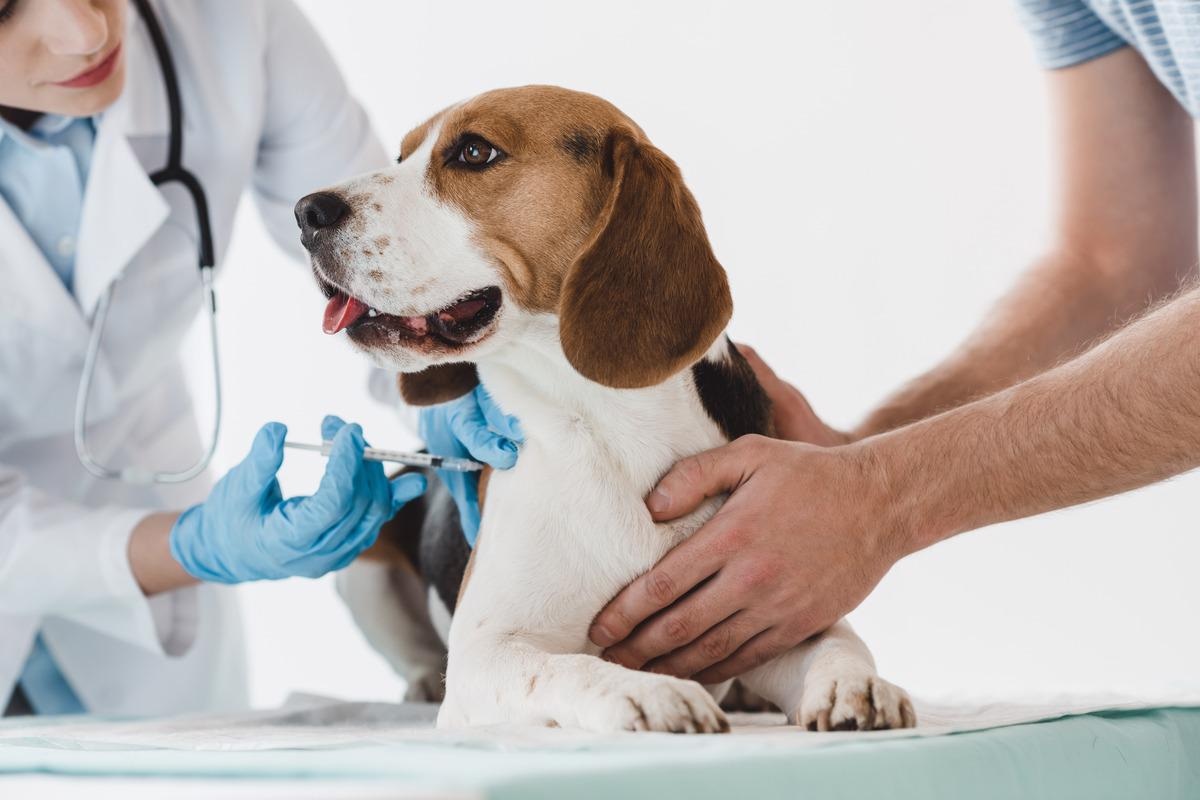Even as the Omicron variant of the severe acute respiratory syndrome coronavirus 2 (SARS-CoV-2), the causative agent of the ongoing coronavirus disease 2019 (COVID-19) pandemic, continues to cause hundreds of thousands of cases worldwide, the rate of hospitalizations and deaths, regarded as the most reliable markers of disease severity at present, are falling in most regions.
However, the sheer magnitude of viral transmission, coupled with the potential for wild mammalian reservoirs that may eventually lead to a repeated spillover of the virus in a mutated form into the human population, has raised much concern among researchers.
 Study: A COVID-19 Vaccine for Dogs Prevents Reverse Zoonosis. Image Credit: LightField Studios/Shutterstock
Study: A COVID-19 Vaccine for Dogs Prevents Reverse Zoonosis. Image Credit: LightField Studios/Shutterstock
A recent study examines the utility of a candidate vaccine developed to protect dogs as representative companion animals against the virus.
Introduction
Reverse zoonosis, or the spread of a zoonotic disease back into animals from infected humans, has been a bugbear for many such viral infections. Like the earlier SARS, MERS, and pH1N1 influenza pathogens that caused earlier pandemics this century, COVID-19 is a zoonotic disease caused by an RNA virus that frequently mutates and infects several animal hosts.
This being the case, coronaviruses are known to cause enteritis or respiratory disease in dogs, depending on the virus species. Members of this genus also infect cats, pigs, and cows, causing a variety of illnesses. COVID-19 itself is thought to have originated from a bat species, with 96% sequence identity between the bat and human viral strains.
Reverse zoonosis has already been reported with the current virus, affecting cats and dogs, tigers, and mink. Such phenomena encourage the development of mutations as well as an animal reservoir. When more than one animal species shows susceptibility to the same virus, the virus adapts to different environments and mixes with coinfecting pathogens. This can lead to the emergence of recombinant viruses, with coronaviruses being especially prone to this kind of genetic mixing.
This would render the current efforts to control human-human transmission in vain, as the spread between humans to animals, and animals among themselves, can provide new possibilities for adaptive mutations and reinfection. Companion animals share the same environment as humans and straddle the border between species due to their long history of domestication. This makes them particularly likely to be infected by such pathogens, causing reverse zoonosis.
The new study, published in the journal Vaccines, reports on an attempt to use the SARS-CoV-2 spike subunit protein to elicit an immune reaction. The spike protein mediates both viral attachment to the host cell via the angiotensin-converting enzyme 2 (ACE2) receptor and cell entry via fusion. The spike protein induces both humoral and cell-mediated immune reactions, particularly the receptor-binding domain (RBD), the immunodominant antigen.
The spike protein has been the focus of most vaccines as a result. In this study, the researchers developed a spike subunit vaccine that could be used in dogs.
What did the study show?
The results showed that the subunit vaccine protected dogs against viral spread from humans. The study included female beagles, none of which developed systemic or specific local side effects of vaccination. A slight increase in body temperature range was also seen in young dogs but not beyond the normal range.
Normally, beagles grow at the highest velocity until they are 4-6 months old and then slow down a little. By one year, they have reached adult size. Following vaccination, the growth rate in beagles was seen to be unchanged at 10-15% a month. Weight loss was also not observed.
Serum neutralization tests were also performed, showing the appearance of significant titers of neutralizing antibodies at 14 days from the second dose of the vaccine. The difference in titer was marked, favoring the group in which adjuvants were added. The titer achieved in all groups was adequate for protection.
In group 2 (the adjuvant group), the titers exceeded those found in double-vaccinated humans (titer of 160). Both groups showed higher titers than those found in symptomatic patients (titer of 160).
However, it did not protect against other endemic seasonal human coronaviruses, such as 229E and OC43, even though they often have a high degree of sequence identity with the coronavirus found in dogs who develop respiratory disease. The occurrence of a cytopathic effect was seen in all cultures where these two viruses were cross-reacted with the antibody elicited by the vaccine, showing the absence of cross-protection.
What are the implications?
The study shows that with or without adjuvants, the spike subunit vaccine produced a healthy antibody response after the second dose, exceeding that found in vaccinated or infected humans. The adjuvanted vaccine group had antibody formation exceeding the other group by six times or more. This is attributable to the stimulation of the monocytes, causing improved innate immune responses that promote better adaptive immunity.
The role of the spike and especially the RBD in inducing cellular immunity is underlined by the results of this experiment. The SARS-CoV- spike did not, however, produce a cross-reactive response to other seasonal endemic human coronaviruses, even though earlier reports have shown that the messenger ribonucleic acid (mRNA) vaccines produced cross-protection to SARS-CoV as well as to the currently circulating virus, perhaps because of their 70% sequence identity.
The neutralizing antibody titer was high and may predict a successful protective immune response following vaccination of dogs. If extended to other companion animals, such a vaccine could help mitigate the ill effects of reverse zoonosis. Further studies will be required in farm and companion animals to establish this practice as one which is valuable for human and animal health.